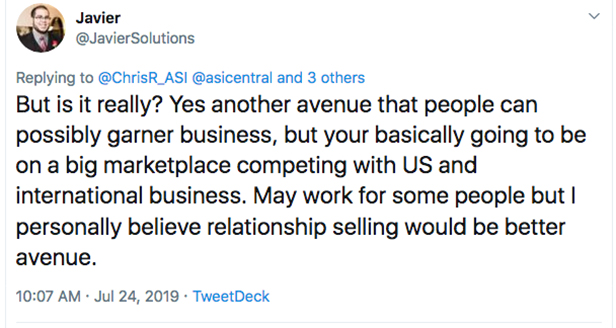News July 23, 2019
U.S. Businesses Can Now Sell On Alibaba
The newly opened online global sales channel presents potential opportunity – and threats -- for promo products firms.
Alibaba.com, the China-headquartered global online marketplace, will now allow small and medium-sized U.S. businesses to sell on its platform. Targeting the business-to-business vertical, Alibaba said Tuesday that it’s keen to get American manufacturers, wholesalers and distributors selling in its marketplace, which has active business buyers in nearly 200 countries.
Big news for the #promotionalproducts industry: eCommerce giant Alibaba will now allow U.S. small businesses to sell on its platform. Opportunity for #promoproducts industry. Watcha think? More to come. @asicentral @PKennedy_ASI @JavierSolutions @ASI_MBell @johnsresnick
— Chris Ruvo (@ChrisR_ASI) July 23, 2019
The development is potentially significant for the U.S. promotional products industry. By selling on Alibaba, ad specialty distributors would have enhanced access to the $23.9 trillion global B2B e-commerce market. A number of promo products distributors, including iPromo (asi/229471) and Sunrise Identity Powered by HALO, have already found success selling on Alibaba’s major e-commerce competitor – Amazon. Before Tuesday, U.S. small- and medium-sized businesses could buy products on Alibaba.com, but not sell.
“Alibaba aims to empower entrepreneurs and help them succeed on their own terms,” John Caplan, head of North America B2B at Alibaba Group, said in a statement. “With 10 million active business buyers in over 190 countries and regions, we are reshaping B2B commerce by providing the tools and services needed for U.S. SMB companies to compete and succeed in today’s global marketplace.”
Promo executives reacted to the news from Alibaba.
Gregg Emmer, vice president and chief operating officer of Top 40 distributor Kaeser & Blair (asi/238600), told Counselor that he expects some industry distributors will migrate to the Alibaba platform. Still, he believes they’re likely to generate only “low margin” sales, as he believes shoppers on the platform will mainly be on the hunt for the lowest price, rather than quality or marketing consultation.
Larry Cohen, CEO of Top 40 distributor Axis Promotions (asi/128263), told Counselor that Alibaba's entry “is not likely to have a dramatic near-term impact. Everything in our industry is decorated and custom, which makes the transaction much more complicated than the traditional SKU-based sale.” Still, Cohen added that “current e-commerce companies in our industry may test this platform to supplement their existing channels.”

Meanwhile, other executives opined that Alibaba’s move presents a new potential threat to the traditional North American promotional products industry business model, which is structured as suppliers selling to distributors who then sell to end-clients. That’s because Alibaba would provide another relatively easy way for suppliers to “sell direct” to end-buyers, bypassing distributors. “Alibaba will provide sophisticated tools for companies to sell and market online, which will enable companies of all sizes to engage in global online sales,” Cohen told Counselor.
Alibaba said it has launched a series of new features to support U.S. companies interested in selling on its platform. Businesses, simply dubbed “sellers” by Alibaba, receive an interface for building and managing a digital store, tools for customer-relationship management and digital marketing, and mechanisms for online payment. Alibaba.com has also created what it calls a Customer Success team in the U.S. to support SMBs.
Alibaba betaed its U.S. sellers service with American companies. One was Gett Clean, a New York-based professional cleaning-products manufacturer. Co-Founder Evan Gettinger said being on Alibaba.com is helping his company expand its reach into international markets like India, Germany, Poland and countries in Africa. “We recognized the opportunity to expedite global growth through Alibaba.com early on,” Gettinger said. “With the new combination of platform tools available and the addition of major, name-brand sellers, we expect a faster path to our growth targets.”
Alibaba noted that it’s signing up so-called U.S. “anchor sellers” – or large companies with name recognition and deep inventories that will help attract a greater number of buyers to the platform. The increased traffic is expected to have a trickledown effect, essentially propelling more buyers to discover the small and medium-sized American businesses selling on the site, according to Alibaba. Office Depot and Robinson Fresh, the produce division of logistics company C.H. Robinson, are anchor sellers that have already established stores on Alibaba.com. They launched on Tuesday.
Beyond bringing anchor sellers aboard, Alibaba has teamed up with software companies and service providers, such as logistics company ShipStation and jobs search engine Indeed, to help out small business sellers through exclusive offers, discounts and educational content. Alibaba is also hosting educational and networking events, dubbed “Build Ups”, to entice American businesses to become sellers. One Build Up was held Tuesday in Brooklyn. Other events are planned in Chicago, Los Angeles and elsewhere.
